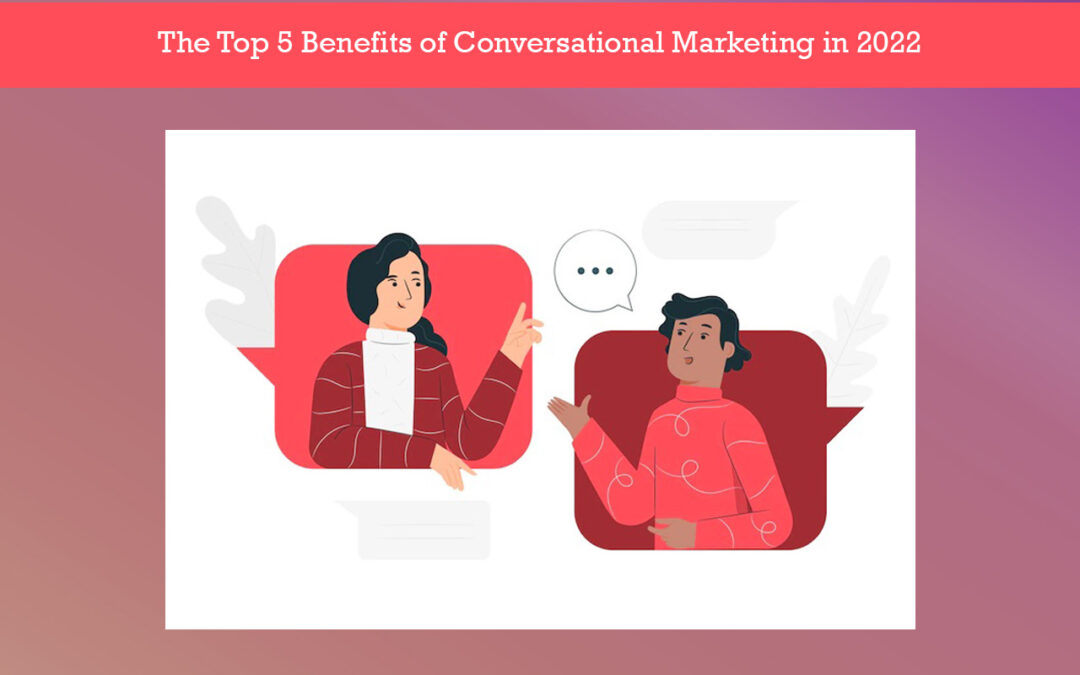Conversational Marketing in 2022, all you need to know
Conversational Marketing is a technique for engaging, qualifying, and converting unsupported sales prospects.
It is the process of determining exactly what users want, understanding their pain points, and providing them with the proper service or promotion in real time.
In order to create a Conversational Marketing strategy to succeed, the idea of communication must be adopted not only in the sales team but also among all potential options.
Conversational Sales is what happens between the lead and a member of staff within the platform, and it’s critical.
It is a method of interacting with website users in real time. It helps them proceed down your sales pipeline by creating a conversation with your audience, as the name implies.
It can be an autonomous system of employing chatbots to communicate with your website’s users, or it can be real-time messaging via live chat or conversational landing pages.
In brief, instead of employing mass communication, this strategy aims to establish a closer relationship with your audience.
What Is Conversational Marketing? The Top 5 Benefits of Conversational Marketing in 2022
It’s crucial to note that incorporating conversational marketing into your digital marketing approach doesn’t have to cause any disruptions to your current procedures.
In fact, it can be used as an alternative to what your company is already doing for lead generation, sales, and customer service. The advantages of conversational marketing are as follows:
- Getting more precise information about your target market
- Personalization helps to strengthen relationships
- Time-saving
- Customer satisfaction improvement
- Using new channels to generate leads and sales
It is essential to note the fact that conversational marketing can boost your approach without requiring any changes to your current operations.

How to practice conversational marketing?
1. Time Is Money
Effective conversational marketing necessitates rapid and timely contact.
Customers and prospects today demand everything to happen in real-time, so keep your social media updated. Make it a priority to resolve customer complaints as rapidly as possible.
This will really help you in enhancing your business performance and lead to growth in sales.
2. Personalization
When customers connect with your brand, they demand highly relevant and tailored experiences.
The cookie-cutter marketing pitch is no longer relevant. Customers are primarily interested in learning about your service in reference to their own business demands.
To develop the relevant insights that your consumer will care about, you must use all of the internal and external data sources at your disposal.
With so much client data available today, analytics technologies that can help you collect and analyze this data should be considered.
The best analytics solutions sit on top of your technology stack and evaluate all internal and external data sources, including social media. These tools give you the whole image of your consumer that you need to send meaningful and relevant communications to them.
3. The Brand Experience Is More Important Than Ever Before
Consumers care about the brand’s experience and the digital marketing that surrounds it. The brand experience is one of the reasons Apple has been so successful.
Other computer retailers do not provide the same experience as the Apple Store. To create a sense of elegance, it was designed after premium boutiques.
Conversational marketing can aid in the creation of a great customer experience by facilitating purchasing decisions and answering questions.
4. Conversational marketing is already being used by your competition
41% of survey participants claim they utilize conversational marketing to complete a transaction or purchase. Approximately 7 out of 10 people use it to get quick answers to their questions.
Live chat is also one of the most popular ways for B2B customers to communicate with businesses.
Consumers want answers and issues to be resolved fast in an ever-changing world. Furthermore, with the arrival of COVID-19, customers are yearning for the in-person interaction that was previously available in stores.
You can address clients in a personal manner from the comfort of their own homes by employing conversational marketing.
When someone visits your website, you have the opportunity to engage with them and begin building consumer relationships. Your response time must be swift, and your AI creations should receive personalized responses.
If you are unable to answer quickly, your conversational marketing plan will be unstable.
If a user is looking for answers and isn’t getting them from an impersonal chatbot or a generic Contact Us form, they will quit. That’s why adding a real, live chat option to your website is a wise choice.
5. Emphasize customer interaction
Conversational marketing differs from other, more conventional tactics in that it is aimed at engaging customers in natural conversations.
You can interact with customers on a human level in ways they may never have experienced with a brand before. Customers will feel more at ease during these chats, and you will be likely to get valuable consumer insights and comprehend leads.
Conversational marketing is a method that complements your current marketing efforts rather than replacing them.
It would be wrong to imply that conversational marketing can replace your other marketing strategies; rather, it may complement them. Ideally, you should use a plan that combines both conventional and conversational tactics.
The most common method of applying conversational marketing is through the use of a chatbot, in which the dialogue flow may be tailored to the user’s individual demands based on the user source or the text being consumed.
Conclusion
Conversational Marketing is a discussion approach for communicating with website users and converting leads. This type of inbound marketing emphasizes consumer interactions rather than one-way brand communication.
Specialists in sales and marketing are always trying to outsmart the algorithms and increase traffic and income. As a result, it becomes difficult for them to give a personalized experience to leads and consumers amid the chaos.
It has evolved as the ideal answer for marketing and advertising around the world in recent years. According to a HubSpot report, over 5 out of 10 organizations use conversational marketing in their digital marketing strategies.

